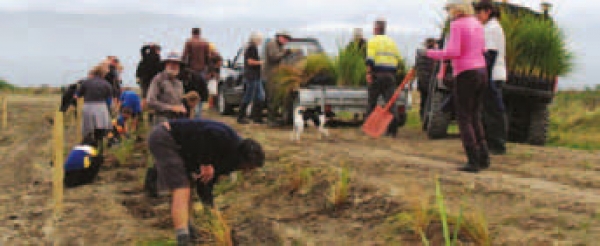Recently over 25 supporters of the Wairio Wetland Restoration Project came together to plant over 2,000 sedges,flaxes, nurse trees and specimen trees.
After being welcomed to the site and reminded by Jim Law of Ducks Unlimited of the Vision to restore the pristine wetland that had previously occupied the site, and after being briefed on the preferred planting technique by Don Bell of the Greater Wellington Regional Council the planting teams then
heard from Bridget Johnson, a Masters student from Victoria University’s Centre for Biodiversity & Restoration Ecology. Bridget’s thesis is focused on restoration work at Wairio and will compare tree survival rates and costs related to different site preparation methods and subsequent maintenance treatments. “That’s why we need the consistent planting technique, otherwise we introduce another rather random variable” said Bridget.
“The whole idea of the research programme is to introduce some scientific rigour to our restoration work” said Jim Law. “We all have our favourite ways of planting and caring for native trees but there is little, if any, science to back up what we do. Dr Hartley, Bridget’s supervisor added “We expect the results of Bridget’s research and the results from future students working at Wairio will be applicable elsewhere around the Lake and at least in the wider Wairarapa”.
So, well briefed on the Vision, planting techniques and the importance of the research programme the planting teams comprising students from the Taratahi Agricultural Training Centre, Ducks Unlimited, Forest & Bird and Rotary members, local iwi and both Department of Conservation and Greater Wellington staff headed off to plant various combinations of nurse and specimen trees in the test beds.
Then the “A” teams arrived, the environmentalists of the future from the Pirinoa, Kahutara and Martinborough Primary Schools. After being similarly greeted and briefed on planting techniques the children all headed off with their minders to plant sedges and flaxes in some soft ground near the water’s edge. “They love it and are proud of what they are doing. They also want to see further development of the wetland” said Steve Davis from Pirinoa.
Then, when the children had finished their planting, it was back to the BBQ provided by Greater Wellington Regional Council for a well learnt sausage! “Tired but happy with what they have achieved” was the consensus. The older planters also had a break at the BBQ but then had to head back to the test beds for more planting but, by the end of the day over 2,000 plants were carefully planted.
“A great effort by all!” said a thankful Bridget.

